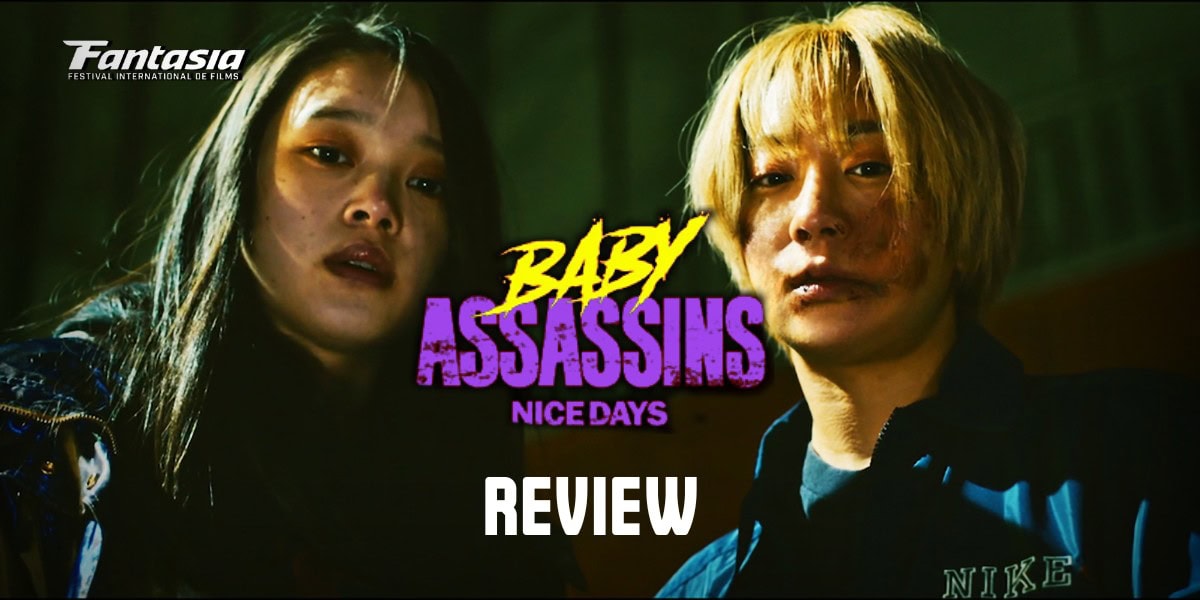Fantasia Fest 2024 Review: ‘Baby Assassins: Nice Days’ Is One of the Best Action Movies Ever Made

No hyperbole. You read this correctly. Yugo Sakamoto has pulled off one of the greatest action movies my eyes have ever witnessed in Baby Assassins: Nice Days, which had its Canadian premiere at the Fantasia International Film Festival. The sequel to Baby Assassins 2, which vastly improved upon the 2022 microbudget first installment that had two amazing action sequences and not much else, Nice Days is a top-to-bottom formal and thematic overhaul that further deepens the relationship between Chisato Sugimoto (Akari Takaishi) and Mahiro Fukagawa (Saori Izawa), assassins under the supervision of a shadowy guild.
On vacation in Miyazaki, Chisato and Mahiro are tasked to eliminate a target (Kaibashira). When they arrive, they realize that someone else, Kaede Fuyumura (Sosuke Ikematsu), is after the same person. He works for another assassin guild, and it will be the last target he must hit before he can officially move on from his life. Because of this, Kaede begins to fight off both Chisato and Mahiro in an action sequence so insane, no words will ever describe how vastly kinetic and energetic it is. The rest of the movie sees the two assassins go after Fuyumura and his target while working alongside guild agents Iruka Minami (Atsuko Maeda) and Riku Nananse (Mondo Otani), a simple chase game, but one that grows even more incredible as Sakamoto throws the audience with one impossible action sequence after the other.
Yugo Sakamoto creates a new action language in Baby Assassins: Nice Days
There’s no denying Sakamoto has become a true force in microbudget filmmaking. With action director Kensuke Sonomura, the two have created a brand-new language in action physicality that is unlike anything that’s ever been done before in the genre. Many have compared how Sakamoto’s style mirrors the one of Chad Stahelski in John Wick. Truth be told, Stahleksi’s movies can’t do half the stuff Sakamoto pulls off in Baby Assassins: Nice Days, at only 28 years old at that. Of course, the emphasis on gun-fu seems highly inspired by Stahelski’s films (and, by extension, the work of John Woo), but Sakamoto elevates it to heights that weren’t even thought possible when the two filmmakers crafted their style and revolutionized action filmmaking.
In Baby Assassins: Nice Days, the human body is the vessel for each massive set piece. It contorts itself, slides go on top of another body, and even uses someone as a human shield while the characters navigate one unpredictable environment after the next. How they deftly move with their bodies makes no sense, and it’s even harder to figure out how they pulled it off. But your mind immediately registers excitement when they see an assassin imitate the movements of a monkey as he fights Chisato and Mahiro in a parking lot, jumps up and down in an attempt to tackle them, and slides down a car while landing in the monkey stance.
It also helps that Sakamoto has visually overhauled the franchise, with far more sweeping and intricate photography than in the first two movies. Many action sequences are treated through dollies, making each set piece feel investing and enveloping. Sakamoto and Sonomura know that the movements speak for themselves. It isn’t so much the visual look of Baby Assassins that will solidify its importance in action filmmaking. It’s all about how the body reacts to a stressful situation and how it can quickly adapt itself in various positions to take down its opponent, no matter how strong it may be.
But Sakamoto understands that the viewer must see each change in Chisato and Mahiro’s movements for us to care about the film’s often playful, but always exciting approach to martial arts action. Taking a page out of the Jackie Chan school of action improvisation, Sakamoto and Sonomura craft larger-than-life fight sequences that always keep us on the edge of our seats, never knowing if Chisato and Mahiro will make it out alive. The first two films had antagonists that were easily beatable for the duo. But this one ups the ante and gives its villain an even bigger backstory and reason to eliminate the two assassins, making him a mightier foe with deeper personal stakes at play.
Akari Takaishi and Saori Izawa continue to impress in this third film
Such an approach to wall-to-wall action wouldn’t have worked were it not for the rock-solid chemistry between Chisato and Mahiro. Luckily, Akari Takaishi and Saori Izawa have already solidified their chemistry in the first two movies. But in those installments, Sakamoto filled many of the runtimes with meandering sequences in their apartment as they await their next assignment. Moving them away from that building and into Miyazaki, Sakamoto already elevates the stakes and their relationship, which grows much more profound and personal than in the last two movies.
Sure, there’s the usual brand of comedy in the beginning, but it doesn’t take long for Baby Assassins: Nice Days to adopt a far more serious tone with the arrival of Fuyumura, whom Sakamoto develops through riveting flashbacks that show how he developed his penchant and addiction for killing. At first, he was clumsy and couldn’t even fire a gun properly. Now, he enjoys the thrill of killing and will do more to satiate his artificial dopamine rush. In representing this emotional shift, Ikematsu more than understands the assignment of portraying a multi-layered villain whose scars and addiction to endless killing have corrupted his soul.
In that regard, he’s the best antagonist the Baby Assassins franchise has ever had, giving Chisato and Mahiro a run for their money so much that the two may not make it out of this mission alive. Their first fight together is pure cinema, while the final duel between Mahiro and Fuyumura comes after a monologue in which the antagonist gives her the reason why he is after the two. Here, Sakamoto breaks the traditional “villain monologue” in favor of the most vulnerable we’ve seen Fuyumura since the first time he killed someone with a gun. In turn, it feels less ‘fun’ to see Mahiro duke herself out with him after he speaks his truth, as we realize one of them will have their life cut short, and both have valid reasons for wanting to kill each other.
Draw dropping action makes Yugo Sakamoto’s Baby Assassins: Nice Days a must-watch
The stakes feel more tangible and emotionally engaging, and, as a result, the action is way more cathartic than in the last two films. It’s an excitingly kinetic and dizzying display of pure intricate stunt work with an emotional center at the story’s center that exalts the film’s stakes to more personal and involving heights. As a result, what Sakamoto and Sonomura have pulled off in Baby Assassins: Nice Days can only be regarded as one of the greatest achievements we’ve seen in action cinema, one whose emotional arc is primarily guided by the multiple bodily contortions used by its protagonists as the ultimate weapon during action sequences.
Few filmmakers understand the poetic nature of the human body. But Sakamoto understands that the only way to make an action as inventive as possible is to create movements with the body that have never been realized on screen. There were so many times when my jaw was on the floor at seeing this brand-new language of action formed in front of my eyes. I’ve seen many old-school Shaw Brothers martial arts films and yet have never witnessed such choreography like this. Ever. Each action piece is a thrill to watch, and analyze, but it’s impossible even to figure out how on earth they pulled any of what’s on-screen off. Combining this with a terrific character-driven story for both Chisato and Mahiro, but also for Fuyumura, makes this Baby Assassins installment the best one yet.
At 28, Yugo Sakamoto has already solidified himself as one of the greatest-ever action innovators, one whose body of work can now be compared to Lau Kar-leung, Takeshi Kitano, Tsui Hark, and Soi Cheang. Who knows if there will be another Baby Assassins movie after this one (they should make fifteen more of these, by the way), but Sakamoto‘s place in action cinema will now be forever enshrined as the one who not only revolutionized the sphere of microbudget filmmaking but has created a language that no one else ever thought possible before the Baby Assassins trilogy.
For more about Baby Assassins: Nice Days at Fantasia Fest 2024, see Fantasia Festival’s website. Are you interested in seeing this movie? Or have you seen it? Let us know what you think on social media @mycosmiccircus!
Fantasia Fest 2024 Review: Penalty Loop Reinvents Time loop Cinema
Fantasia Fest 2024 Review: Exciting Action Doesn’t Quite Save Out of the Shadow




